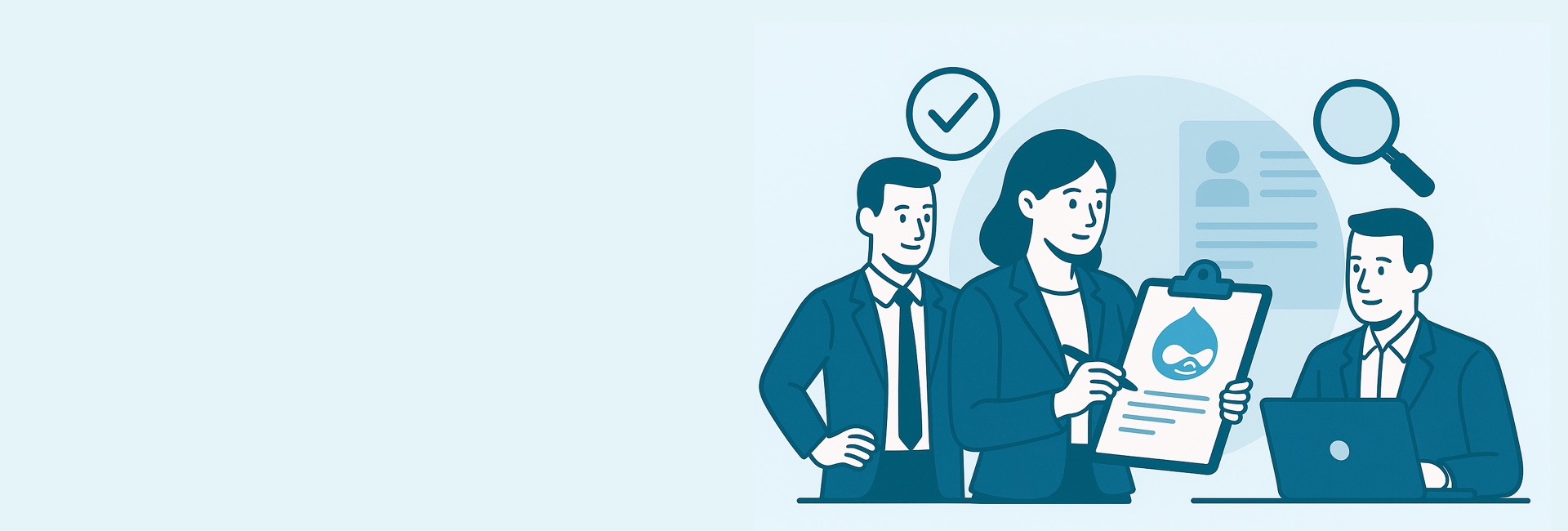
How to Choose the Right Drupal Developer for Your Project
When you’re planning to build or upgrade a Drupal website, one of the most critical decisions you’ll make is choosing the right Drupal developer. Whether you’re launching a corporate portal, an e-commerce store, a government platform, or an educational website, your developer will directly influence your project’s quality, timeline, scalability, and ROI.
As a Drupal web agency, we’ve seen businesses waste valuable time and money by working with the wrong fit — and we’ve also seen projects succeed brilliantly when the right talent is involved. This guide will help you navigate the process and hire a Drupal developer who aligns with your goals.
Why the Right Drupal Developer Matters
Drupal is a powerful, flexible CMS — but it’s also complex. Unlike beginner-friendly platforms, Drupal requires in-depth technical knowledge, strong problem-solving skills, and experience with modules, theming, and site architecture. The wrong developer may deliver a site that’s difficult to manage, poorly optimized for performance, or hard to scale.
The right developer will:
- Build a secure, fast, and user-friendly Drupal site
- Ensure SEO optimization from the start
- Customize features to your exact needs
- Provide long-term scalability and support
Step-by-Step Guide to Choosing the Right Drupal Developer
1. Define Your Project Scope and Goals
Before you even start searching, you need clarity on:
- Purpose of the website – corporate site, e-commerce, government portal, intranet, etc.
- Features you need – multilingual support, payment gateways, API integrations, user roles.
- Timeline and budget – realistic but firm.
💡 Tip: A clear brief helps you evaluate whether a developer has the right skills for your Drupal project.
2. Look for Proven Drupal Expertise
Not every PHP developer is a Drupal expert. Look for:
- Portfolio of Drupal projects similar to yours.
- Experience with Drupal 9 or Drupal 10 (and upcoming versions).
- Familiarity with core and contributed modules, as well as custom module development.
- Understanding of Drupal theming and Twig templates.
3. Check Their Knowledge of SEO and Performance Optimization
Your website should not just look great — it must rank well on search engines and load fast.
A skilled Drupal developer should know:
- How to structure content types for SEO
- Use of schema markup in Drupal
- Configuring Drupal caching for speed
- Image optimization and CDN integration
💡 Pro insight: SEO and performance are often overlooked in development, but they’re essential for visibility and user retention.
4. Evaluate Communication Skills
A technically brilliant developer who can’t communicate effectively can derail your project. Look for someone who:
- Understands your requirements without constant re-explanation
- Provides clear progress updates
- Is open to feedback and changes
In an agency setting, we ensure our Drupal developers work closely with project managers so clients get both technical skill and clear communication.
5. Verify Their Problem-Solving Abilities
Drupal projects often involve complex challenges: integrating with CRMs, migrating large databases, or building custom workflows. Ask potential developers about:
- Past challenges they’ve faced
- How they solved them
- How they approach testing and debugging
6. Assess Their Security Knowledge
Security is a major reason businesses choose Drupal — it’s trusted by governments, universities, and large corporations. But that security depends on the developer implementing best practices. They should:
- Keep Drupal core and modules updated
- Configure user permissions carefully
- Use secure coding standards and input validation
- Follow the Drupal Security Team advisories
7. Understand Their Support and Maintenance Plans
Your relationship with a Drupal developer doesn’t end at launch. You’ll need:
- Ongoing security updates
- Module upgrades
- Bug fixes
- Feature enhancements
A professional Drupal web agency will offer retainer packages or on-demand support so your site stays functional and secure.
8. Compare Costs — But Don’t Just Go for the Cheapest
While budget matters, cheaper isn’t always better. An inexperienced developer may create issues that cost far more to fix later. Instead:
- Compare quotes from multiple developers/agencies
- Evaluate what’s included — project management, QA, training, SEO setup, etc.
- Consider long-term ROI, not just upfront cost
9. Decide Between a Freelancer and a Drupal Agency
Freelancers can be a good fit for small projects, but for complex builds, an experienced Drupal agency often provides better value:
- Multiple skill sets in one team (design, development, SEO, QA)
- Faster turnaround times
- Proven workflows and quality control
- Better scalability for future growth
10. Ask the Right Interview Questions
When talking to a potential Drupal developer, ask:
- How many years of Drupal experience do you have?
- Have you worked with Drupal 10?
- Can you show me live Drupal websites you’ve built?
- How do you handle Drupal security updates?
- How do you ensure SEO-friendliness in your builds?
Common Mistakes to Avoid When Hiring a Drupal Developer
- Not checking references – Always verify past clients’ feedback.
- Ignoring communication style – Misunderstandings can delay projects.
- Not discussing ownership – Ensure you own the site and code after launch.
- Skipping maintenance discussions – A Drupal site without updates is a ticking time bomb.
Conclusion
Choosing the right Drupal developer is an investment in your project’s success. A skilled, experienced, and communicative developer — especially from a specialized Drupal agency — will deliver a secure, scalable, and SEO-optimized website tailored to your goals.
At our Drupal web agency, we combine technical excellence with transparent communication and long-term support, ensuring your project is delivered on time, within budget, and ready to grow with your business.